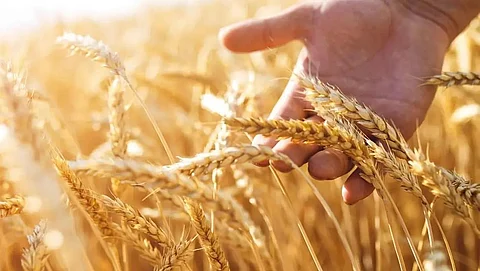
- Home
- Live Blog
- Breaking News
- Top Headlines
- Cities
- NE News
- Sentinel Media
- Sports
- Education
- Jobs

Narendra Singh Tomar
(The writer is the Union Agriculture Minister. Views are personal.)
Sustainable
agriculture is essential for ensuring that India achieves its national security
goal for its 1.4 billion people. Under the guidance of Prime Minister Narendra
Modi, the Ministry of Chemicals and Fertilizers took proactive initiatives to
address the growing issue of imbalanced chemical fertiliser usage.
These initiatives aim to structurally transform Indian agriculture through the synergy of various efforts in policy intervention, investment, financial support, technological intervention, and value addition. Recognising the urgency of the situation, on June 28, 2023, the Cabinet Committee on Economic Affairs (CCEA) approved a series of initiatives to continue with the Urea Subsidy Scheme and promote the adoption of organic fertilisers, with a total outlay of Rs 370,128.7 crore. This reflects the government’s strong commitment to sustainable agriculture and the well-being of more than 120 million farmers with 141 billion hectares of land holdings. The major initiatives taken by the government are listed below:
Extending the Urea Subsidy Scheme
The CCEA has granted an extension to the Urea Subsidy Scheme till March 31, 2025, with an allocation of Rs 368,676.70 crore. This extension encompasses the financial years from 2022–23 to 2024–25. With the Modi government’s thrust towards indigenous production, the country has increased its urea production capacity from 207.54 lakh metric tonnes (LMT) in 2014–15 to 283.74 LMT in 2022–23. This enhanced production with the urea subsidy extension will ensure the accessibility of affordable urea to farmers throughout the nation.
Strengthening of the nanourea ecosystem
India has developed the world’s first nanourea liquid indigenously and has produced it commercially to empower Indian farmers with an innovative, eco-friendly, and economical product. Till March 2023, 76.5 million bottles (equivalent to 33.6 LMT of conventional urea) have been produced, and 54.2 million bottles have been sold. By 2025–26, eight nanourea plants with a production capacity of 440 million bottles, equaling 195 LMT of conventional urea, will be commissioned. Farmers are also introduced to nanoDAP as an effective and cost-efficient alternative to conventional DAP.
Under the aegis of Aatmanirbhar Bharat, the government has set up and revived six urea production units: Chambal Fertilisers Ltd. in Kota, Rajasthan; Matix Ltd. in Panagarh, West Bengal; Ramagundam, Telangana; Gorakhpur, Uttar Pradesh; Sindri, Jharkhand; and Barauni, Bihar. These indigenous production units and nano-urea plants will reduce the current import dependency on urea and finally make us aatmanirbhar (self-reliant) on urea by 2025–26.
Supporting organic fertilisers through GOBARdhan
Under the Market Development Assistance (MDA) component, the government will provide support at the rate of Rs 1,500 per metric tonne for organic fertilisers produced at plants associated with the unique, multipronged, waste-to-wealth GOBARdhan initiative. This holistic and integrated approach incorporates various biogas and renewable energy schemes, waste management programmes, and sanitation initiatives.
With a total outlay of Rs 1,451.84 crore for FY 2023–24 to FY 2025–26, this funding will also include research gap funding of Rs 360 crore, further bolstering the growth of organic fertilisers in India. To provide farm inputs (including organic fertiliser) and services as a one-stop solution for farmers and empower them, about 100,000 unique model farm inputs and service outlets, the ‘Pradhan Mantri Kisan Samruddhi Kendras’, have been established nationwide.
Introducing PM Pranam
As an eco-friendly and sustainable initiative, the government introduced the PM Programme for Restoration, Awareness Generation, Nourishment, and Amelioration of Mother Earth (PM PRANAM). This scheme incentivizes states and Union Territories to embrace natural farming practises, promote alternative fertilisers, and encourage the balanced utilisation of chemical fertilisers. The incentive funds allocated for 2025–26 will be disbursed in 2026–27, highlighting the government’s long-term vision for sustainable agriculture.
Innovative urea gold
The approval also introduces a new-age, value-added urea called “Urea Gold,” featuring a sulphur coating. This innovative coating will make an important secondary plant nutrient, sulphur, available to crops. “Urea Gold” reduces urea consumption and enhances crop productivity by ensuring slow release and improved nitrogen use efficiency. This sustainable fertiliser option aligns with the government’s efforts to improve nutrient management and optimise urea manufacturing processes.
The recent approvals by the Cabinet Committee on Economic Affairs demonstrate the unwavering commitment of the Indian government to sustainable agriculture and the wellbeing of farmers. The extension of the Urea Subsidy Scheme, the introduction of PM PRANAM, support for organic fertilisers through GOBARdhan, and the innovative Urea Gold all contribute to building a more eco-friendly and efficient agricultural sector. In addition to these initiatives, the government has also launched mass awareness campaigns to promote the balanced use of chemical fertilisers and adopt alternative fertilisers such as organic, bio, and nano fertilisers. These efforts are aimed at ameliorating the soil and nourishing Mother Earth.
As the Modi government marks nine years of dedicated service to the nation, it is crucial to acknowledge the multitude of welfare schemes implemented to empower and uplift the agriculture sector. The government envisions a new India guided by the principles of “SabkaSath, SabkaVikas, and SabkaVishwas,” with the welfare of farmers being an integral aspect of this vision. These schemes aim to enhance farmers’ livelihoods, promote sustainable agricultural practises, and foster overall development in the agricultural sector. It underscores the government’s commitment to creating a prosperous and inclusive India where farmers play a pivotal role in the nation’s progress.